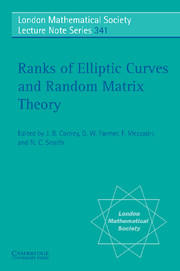Book contents
- Frontmatter
- Contents
- Introduction
- FAMILIES
- RANKS OF QUADRATIC TWISTS
- NUMBER FIELDS AND HIGHER TWISTS
- SHIMURA CORRESPONDENCE, AND TWISTS
- Computing central values of L-functions
- Computation of central value of quadratic twists of modular L-functions
- Examples of Shimura correspondence for level p2 and real quadratic twists
- Central values of quadratic twists for a modular form of weight 4
- GLOBAL STRUCTURE: SHA AND DESCENT
- Index
Computing central values of L-functions
Published online by Cambridge University Press: 10 November 2010
- Frontmatter
- Contents
- Introduction
- FAMILIES
- RANKS OF QUADRATIC TWISTS
- NUMBER FIELDS AND HIGHER TWISTS
- SHIMURA CORRESPONDENCE, AND TWISTS
- Computing central values of L-functions
- Computation of central value of quadratic twists of modular L-functions
- Examples of Shimura correspondence for level p2 and real quadratic twists
- Central values of quadratic twists for a modular form of weight 4
- GLOBAL STRUCTURE: SHA AND DESCENT
- Index
Summary
How fast can we compute the value of an L-function at the center of the critical strip?
We will divide this question into two separate questions while also making it more precise. Fix an elliptic curve E defined over ℚ and let L(E, s) be its L-series. For each fundamental discriminant D let L(E, D, s) be the Lseries of the twist ED of E by the corresponding quadratic character; note that L(E, 1, s) = L(E, s).
A. How fast can we compute the central value L(E, 1)?
B. How fast can we compute L(E, D, 1) for D in some interval say a ≤ D ≤ b?
These questions are obviously related but, as we will argue below, are not identical.
We should perhaps clarify what to compute means. First of all, we know, thanks to the work of Wiles and others, that L(E, s) = L(f, s) for some modular form f of weight 2; hence, L(E, s), first defined on the half-plane ℜ(s)> 3/2, extends to an analytic function on the whole s-plane which satisfies a functional equation as s goes to 2 – s. In particular, it makes sense to talk about the value L(E, 1) of our L-function at the center of symmetry s = 1. The same reasoning applies to L(E, D, s).
As a first approximation to our question we may simply want to know the real number L(E, D, 1) to some precision given in advance; but we can expect something better.
Information
- Type
- Chapter
- Information
- Ranks of Elliptic Curves and Random Matrix Theory , pp. 260 - 272Publisher: Cambridge University PressPrint publication year: 2007
